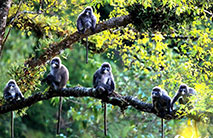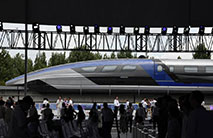IOC media operation chief: Olympic reporting under pandemic
TOKYO, July 30 (Xinhua) -- Under the current situation of COVID-19 with non-spectator competitions at Tokyo 2020, media's role has become much more essential for conveying text, photo and new-media messages to audiences around the world. At the same time, media operations under COVID-19 countermeasures has become a big challenge as well. All those issues are brought to Lucia Montanarella, Associate Director of Olympic Games Media Operations of the IOC, to manage Olympic media operations in Tokyo with safety and excellence.
FROM 6,000 TO 4,000
IOC media operations provides guidelines of media facilities and services, including operating the Main Press Center and Venue Media Center, coordinating transport, accommodation and accreditation, as well as Olympic information services to all accredited media worldwide at the Olympic Games.
Lucia came to the new position at the IOC media operation with less than 200 days to the Tokyo Olympic Games, but following the historic postponement of the Games by 12 months due to coronavirus, the previous media operations plan needs to be adjusted immediately.
The very first challenge Lucia and her team face is whether the media would travel on site to the Olympics as planned. "The quota of the summer Games is 6,000 accredited press. However, right now on the ground, we have just over 4,000 of accredited press who traveled to Tokyo," Lucia told Xinhua, that the impact of the COVID-19 did discourage a number of media to travel to Japan.
LIVE-STREAMING, FLOW-LIMITING AND SOCIAL DISTANCING
To safely report the Games under the impact of COVID is another challenge for Lucia. The mixed zone interviews, press conferences and photo operations cannot operate in the traditional way. Lucia and her team have managed several ways as alternatives.
For press conferences, Lucia has made the video of medalists' press conferences for the first time in the Olympic history live-streamed and on-demand on the INFO system - a web-based platform providing all Olympic-related information to accredited media. Media can access the press conference via video live-streams or to have a downloaded video of the whole process afterwards, which largely decreases the scale of gathering inside the press conference hall.
To eventually realize this idea is not easy at all, as it means to defuse part of the benefits of the rights-holding broadcasters, who contributes 73% of the annual revenues of the IOC. To balance this issue, Lucia and her team have requested the amendment of the news access rules, to cater the functions of Olympic press conference to the situation of a pandemic.
"This is already a big turning point. So it's a great thing that for the news access rules for these Games, you can use the press conferences. I cannot say what happens in the future, but I think this is for sure something is going to stay."
Lucia's team also made efforts in ensuring a safer reporting environment by organizing reservation process to book interviews, and implementing social distancing. Media who wish to conduct interviews in certain venues must book the slot in advance. According to the Tokyo 2020 Playbook, the distance between media and athletes should be at least two meters. There're physical divides making sure that such policy is obeyed, and the physical distancing can be seen everywhere inside the media centers.
"You're working here, you see I'm in the physical distancing. The wearing mask is working very well. I think this is a very special venue so it allows people to work with space," Lucia commented on the Main Media Center's COVID countermeasures.
LOOKING AHEAD TO BEIJING 2022
With only six months away from the Beijing 2022's opening ceremony, Lucia is currently managing two Games' media operations at the same time. Moving forward, she is optimistic on the current measures to ensure a safe reporting during the Olympics.
"These Games have not finished, so we have to finish these Games and then we will sit down with BOCOG press operations and look at what are the lessons learned. As I mentioned, things are going well here. So the mixed zones are working well with people having physical distancing and having access to athletes," said Lucia.
"Access to athletes in person is something that is paramount of importance for us, so we will maintain that. Also we will make sure that the quality of the broadcast press conference is on line and is of high level and that's something will stay, as I mentioned, that will be possible changes in the booking system, but something that we have to wait for the end of the games to discuss," she added.
The digital age has brought about profound changes in media reporting, especially under the pandemic. Lucia's team is also aware of this change and try to make balances in terms of Olympic reporting. "So the IOC always pays attention to the revolution of social media, but everything needs to be done align with the rights holding broadcasters, needs to protect the footage of the Games. And obviously we will work and see how we can increase the use of social media, but that's not our goal. Our goal is to make sure that accredited press, written press and photographers and non-rights-holding broadcasters can do their job at their best at the Games," she commented.
Photos
Related Stories
- Chinese swimmer Wang wins men's 200m IM at Tokyo Olympics
- Chinese boxer Xu ready to defend WBA title for the third time
- Defending champions China suffer 3rd straight defeat in Olympic women's volleyball
- Zhang Yufei, China's rising butterfly queen
- All-Chinese finals in Olympic men's, women's singles table tennis
Copyright © 2021 People's Daily Online. All Rights Reserved.










